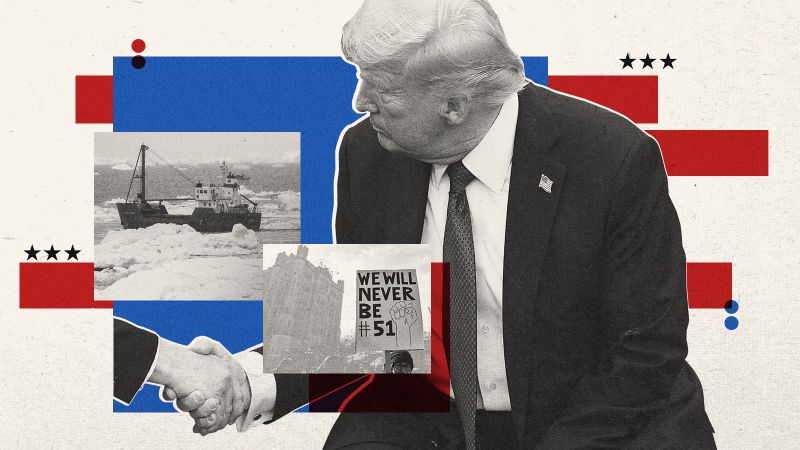President Donald Trump’s administration has taken a bold approach during his second term, with a focus on territorial expansion and security. This exploration raises questions not only about his ability to execute these ideas but also about international relations and human rights implications. One prominent discussion geared towards acquiring Greenland has materialized, a move that Trump has hinted at with the potential for coercion or military force to ensure that the U.S. takes control over the largest island globally. Vice President JD Vance’s visit to Greenland serves as a window into this ambition. His remarks, especially about the perceived threats from Denmark, reveal a contentious relationship between the U.S. and the small European nation.
Greenland has been a point of contention, with the Danish government firmly stating that “Greenland is not for sale,” insisting that the security of the area has been maintained through the presence of U.S. military bases established during World War II. Here, locals express their disdain, implying that they are not welcoming at any level. Vance’s attitude reflects the aspiration to have a longer U.S. presence there, but resistance from both the locals and the Danish government complicates this straightforward projection of power.
Interestingly, Trump revives the idea of Manifest Destiny, drawing parallels with historical annexations and expansions of the U.S. Throughout history, this notion has justified colonialism, expansion, and even slavery. Trump’s ambitions appear to echo sentiments from the 19th century, as he expresses interest in more than just Greenland. His eye also wanders to other territories like Panama, declaring an unsubstantiated claim over the Panama Canal, suggesting that protective measures would need to be put in place. Such declarations raise eyebrows and emphasize the confrontational stance he seems determined to adopt, disregarding international laws and agreements.
In a rather grandiloquent style, Trump also publicly stated that the U.S. should “own” Gaza, suggesting turning it into a prosperous enclave reminiscent of lavish resorts, which he provocatively branded “the Riviera of the Middle East.” Republican Senator Lindsey Graham’s mild disagreement captures the essence of the political turmoil surrounding these assertions, revealing resistance—both subtle and overt—from various quarters, including the Arab community and congressional leaders.
Shifting the focus to North America, Trump expresses a bizarre desire for Canada to become the 51st state of the Union. This rhetoric not only hints at his frustration with Canadian trade practices but seems to trivialize the autonomy and nationalism of Canadian citizens. Trump’s flippant remarks during press conferences have incited significant backlash from Canadian citizens who showcase their displeasure through various public spectacles, such as booing the U.S. national anthem at hockey games.
Tensions rise as American politics intersect with global challenges, particularly in Ukraine. During a significant diplomatic meeting with Ukrainian President Volodymyr Zelensky, the conversation spirals into chaos as Trump implies leveraging U.S. support in negotiations with Putin. His queries about economic assistance and projecting a tone of coercion only deepen the rifts in international relations. The notion that Zelensky should be grateful for diplomacy when Ukraine’s sovereignty hangs in the balance evokes a sense of disbelief from observers of the proceedings.
Meanwhile, a closer look at Trump’s immigration policies reveals ongoing challenges. His nationwide emergency declaration promises bold actions at the southern border, though results produce little dramatic change. Initial expectations set by Trump during his inaugural address are met with apprehension amid slow-moving results and legal restrictions. Increased deportations have been sluggish when contrasted against his previously proclaimed urgency.
In an unexpected turn, the complexity of immigration takes a notable twist with the deportation saga surrounding Kilmar Armando Abrego Garcia, leading to a constitutional conundrum. As the Trump administration faces accusations of erroneous and unjust deportation practices, legal oversight becomes a recurring theme. The rhetoric surrounding legality and human rights juxtaposes with a hardline stance that evokes both domestic and international outcry.
Throughout all these discussions, whether over the potential control over Greenland or tumultuous diplomatic exchanges with foreign leaders, Trump’s second term encapsulates a ruthless ambition riddled with controversy, threats, and a dramatic reshaping of the U.S. foreign policy landscape. As these events unfold, it poses critical questions about the ethical implications of power and the international principles that guide global governance. The reality rests in the precarious balance between aspiration and the genuine will of the nations directly impacted by these policies.



